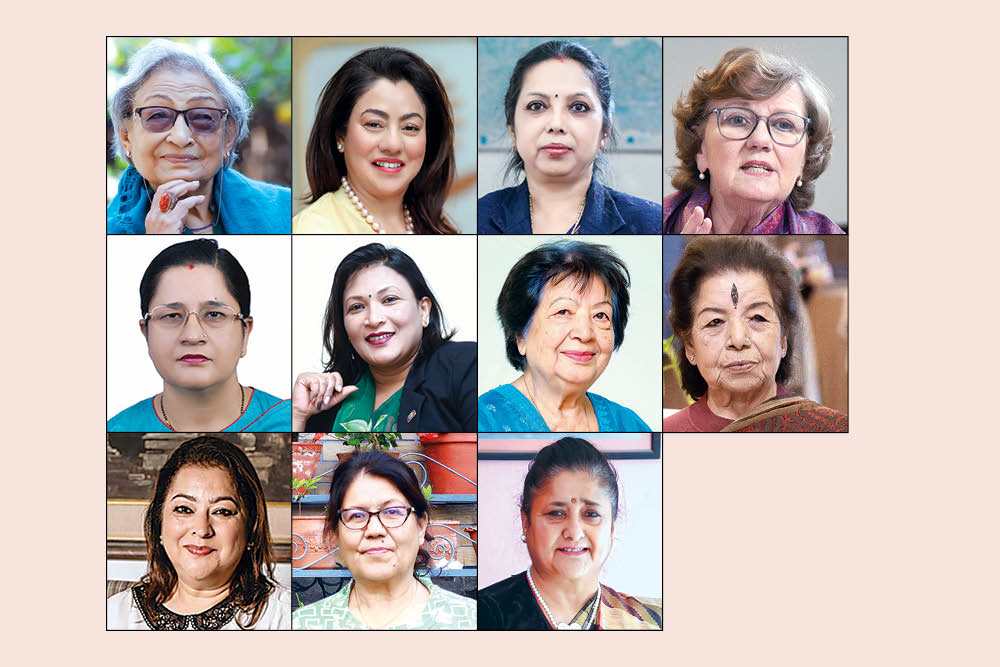
Text: Ashika Pokharel & Preeti Pantha
Business and entrepreneurship recognised only a small percentage of women’s engagement in owning and running businesses earlier, but in recent times, this has witnessed a remarkable change. According to the National Economic Census 2018, published by the Central Bureau of Statistics, 29% of establishments of the total 922,356 in the country are owned by women. Moreover, the report states that the number of female managers in the country is 273,000 accounting for 29.6% of the total number.
Further, the report highlights that at the national level there were 3,228,457 persons working in establishments out of which females comprised 1,216,220 making it 37.7%. Delving into the data of each province, a similar trend follows. In Bagmati province, there are 486,714 females compared to 731,783 males. Similarly, 60,168 females opposed to 125,032 males in Sudurpashchim province.
The report further draws attention to the number of establishments by section of industrial classification and sex of owner. Here, data shows that women owners accounted for the highest number (153,799) in wholesale and retail trade whereas only eight women owners were seen in real estate activities.
Women who make up more than half of the population in Nepal can be a catalyst of change to fuel Nepal’s socio-economic progress. However, the Women, Business and Law 2023 report states that women-led businesses in Nepal were twice as likely to get rejected if they applied for loans and they faced a hard time repaying loans compelling them to quit. The ecosystem of women entrepreneurship in Nepal needs encouragement and better access to finance as that remains the greatest obstacle for women. The government does have certain policies and acts to encourage women entrepreneurship. According to the Industrial Enterprise Act 2016 there is a 35% discount on industry registration, and 20% discount on industrial property registration for women entrepreneurs. They are also given priority to establish their business inside industrial zones and also are provided export loans if needed. Income tax is exempted for any micro industry for up to seven years. And for women-run micro industry income tax is exempted for up to 10 years. However, its implementation and effectiveness remain questionable.
In this edition of Business 360, we spoke to the country’s leading women entrepreneurs and professionals that have pioneered the business landscape breaking barriers of patriarchy and discrimination to create noteworthy careers and contribution to society.
Ambica Shrestha
President, Dwarika’s Hotels and Resorts
-1712731260.jpg)
As the eldest child of Khadga Bahadur Pradhan and Padma Kesari, Ambica Shrestha was born in Sikkim, India. Coming from a well-educated and open-minded family, Shrestha received her initial education from Darjeeling. In 1955, she got married to Dwarika Das Shrestha and came to Nepal. After marriage, her husband left the joint family. She then started teaching at Kanti Ishawari School. She also privately completed her higher education. Her husband had begun to find and restore carved wooden artifacts. They started a small guest house on a trial basis but with a good response from the market, in 1977 they registered a 10-room hotel. After her husband died in 1992, Shrestha continued to pioneer Dwarika’s to what it is today; an 85-room boutique hotel with various restaurants and fine dining showcasing the best of Nepali hospitality to some of world’s top celebrities and business persons. Shrestha is the President of Dwarika’s Hotels and Resorts.
She has been the President of the Federation of Business and Professional Women Nepal and the President of Nepal Heritage Society. She is a role model across generations for women entrepreneurs and has been a strong advocate of financial empowerment and skill development.
Shrestha has been felicitated with various awards including the Gorkha Dakshin Bahu and Decoration of the Cruz de Oficial De la Orden De Isabel La Catolica by His Majesty the King Juan Carlos I, Spain and the highest Award in Rotary “Service Above Self” Award.
“To become an entrepreneur or whatever you want to, you have to work very hard. The other thing is that yes, if you are rich and you can put money to start something then that’s different. But if you are not rich and you have a limited amount of finance to start a business you have to have patience. Don’t jump to have bigger aspirations. Don’t run like a rabbit but walk like a tortoise. The slow wins the race. When the race is done, it is more solid. Because of this, you will know where the base is. Don’t do what everyone is doing, don’t follow everyone. Look at the market, see what is necessary, see what would sell.”
Bhawani Rana
Former President, Federation of Nepalese Chambers of Commerce and Industry

Bhawani Rana grew up in a supportive and politically aware family. After school, she pursued Politics as a major for her Bachelor’s degree at Lucknow University. Rana had an entrepreneurial interest from an early age. After graduation, she wanted to run her own business so she stepped into the fashion industry. Despite the failure of her first venture, she remained optimistic. In this time, she met her husband with whom she first set up the ten-room Hotel Sneha in Nepalgunj which has now expanded into a 65-room four-star hotel.
Rana is the Director of Hotel Sneha and Chairperson of Sneha Group. She holds the distinction of being elected as the first woman President of the Federation of Nepalese Chambers of Commerce and Industry (FNCCI) in April 2017.
She also co-founded the Federation of Women Entrepreneurs Associations of Nepal (FWEAN) in 2003 with a vision to provide socio-economic empowerment for women and advocate for women entrepreneurship.
Rana is decorated with outstanding awards and recognitions, including the National Award from the President of Nepal.
“You should stay away from all the negativity. When you try to achieve your goal, there will be a lot of negative comments. Just ignore them. Don’t lose your heart and just chase your dream. I think you can touch the sky. If you start feeling bad about the negative comments, you can never get ahead. Of course, people will try to pull you down or demoralise you but I was never intimidated by all these things.”
Kamini Rajbhandari
Former Managing Director, Nepal Telecom
-1712731870.jpg)
Kamini Rajbhandari is one of the leading women in the field of information technology in Nepal. She is best known for her impressive tenure as the first and only woman Managing Director of Nepal Telecom (as of 2079). With more than 30 years of experience in the field, she played an important role in the introduction and expansion of the 4G network all over the country, starting 4G mobile service, and preparing the base for further expansion.
Rajbhandari joined Nepal Telecom in 2042 as an engineer and worked her way up to the highest position as its Managing Director in 2073. Nepal Telecom is the largest business organisation in the country, whether it is paying more revenue to the government or the number of employees and probably the biggest information and communication technology service provider. Her business skills, leadership abilities, and ability to stay up-to-date have been instrumental in her reaching the prestigious position of managing director of such a large organisation.
One of Rajbhandari’s most notable achievements was her pivotal role in successfully launching 4G mobile service in Nepal at the right time, which resulted in a much faster expansion of the service. She also implemented the plan and transformation of Nepal Telecom fixed lines to IP based technology (Next Generation Technology) with 100% data service. Her vision and leadership also led to the preparation of a plan to expand the fibre network, providing high-speed internet service throughout the country. Furthermore, she advanced the work to expand optical fibre in Provinces 1, 2 and 3 through the Mid-Hill Highway using the Rural Telecommunications Development Fund.
Rajbhandari graduated first-class from Punjab Engineering College, Chandigarh, India, with a Bachelor’s in Electronics and Electrical Communication (BE). She also completed a Business Administration (Management of Technology) degree from the Asian Institute of Technology in Bangkok, Thailand.
Rajbhandari was awarded the ‘Outstanding Woman Engineer of the Year’ by Nepal Engineers’ Association. In 2017, she was awarded the ‘Outstanding Management Award’ by Management Association of Nepal.
“If you remain relentless in your pursuit and work tirelessly towards your goal, you can achieve anything you set your mind to. So, never give up on your dreams, keep pushing forward and believe in your ability to succeed.”
Lucky Chhetri
Chief Executive Director, 3 Sisters Adventure and Trekking
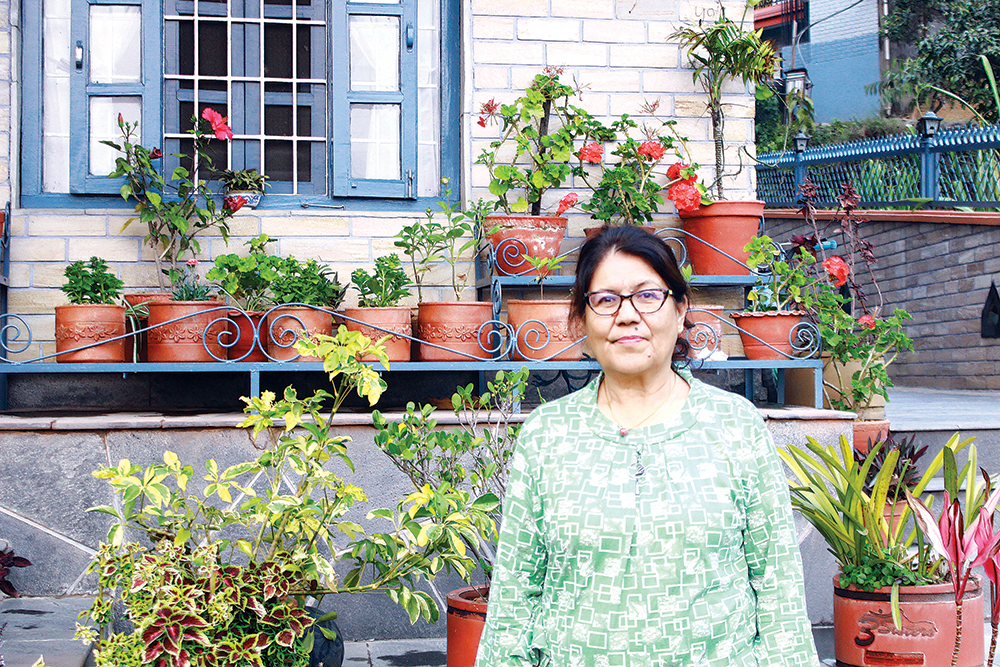
The 3 sisters: Lucky, Dicky, and Nicky Chhetri are pioneers in the field of female trekking guides. Since 1994, through their 3 sisters’ Adventure Trekking agency and their NGO called Empowering Women of Nepal, they have been creating impact. Entering an uncharted territory in the early 90’s, they broke through societal restrictions to create successful careers. But that was not enough and they wanted to share their impact with a larger group of women and started a training program through their NGO to teach local women the necessary skills for trekking and guiding. Almost 2,000 women from all over Nepal have completed this training.
Lucky Chhetri is the Chief Executive Director of the 3 Sisters Adventure Trekking. Pioneering the promotion of female trekking guides in the Himalayas, Chhetri was selected as the first runner-up in the Leadership Commitment category at the inaugural Asia-Pacific Women’s Empowerment Principles (WEPs) Awards Ceremony in 2021 in Bangkok Thailand. In 2017, the Tourism Entrepreneur Women’s Association of Nepal (TEWAN), Pokhara selected Lucky Chhetri as the President of the association established to ensure the rights of women working in the tourism industry. She defines economic empowerment as independence, choices, self-dignity, and confidence in self.
“In our three-decade entrepreneurial journey we have faced several challenges and learned a lot. Entrepreneurs should not just be limited to selling or buying products. However, the enterprise should fulfil the local requirements and emphasise the local products.”
Maggie Shah
Chairperson, Himalayan Distillery
-1712732554.jpg)
Born in the USA, Maggie Shah is an entrepreneur, industrialist and social worker who owns a business conglomerate built around the alco-beverage industry. Shah arrived in Nepal at the age of 19, in 1970, married to Vijay Shah. She joined the family business and has worked to contribute to the growth, modernisation and expansion of the business alongside her husband.
Shah also founded Surya Silks, a sericulture business besides working and serving on the boards of various women empowerment and handicrafts organisations. She believes that economic empowerment means to have decision-making power, independence and of course, freedom.
She has also led her businesses with a strong focus on giving back to the community, working strongly to ensure a culture of diversity, equality and inclusion.
“Do the hard work. Never take ‘no’ for an answer and try to find solutions for all the challenges that come along, don’t run away.”
Neelam Dhungana Timsina
Deputy Governor, Nepal Rastra Bank
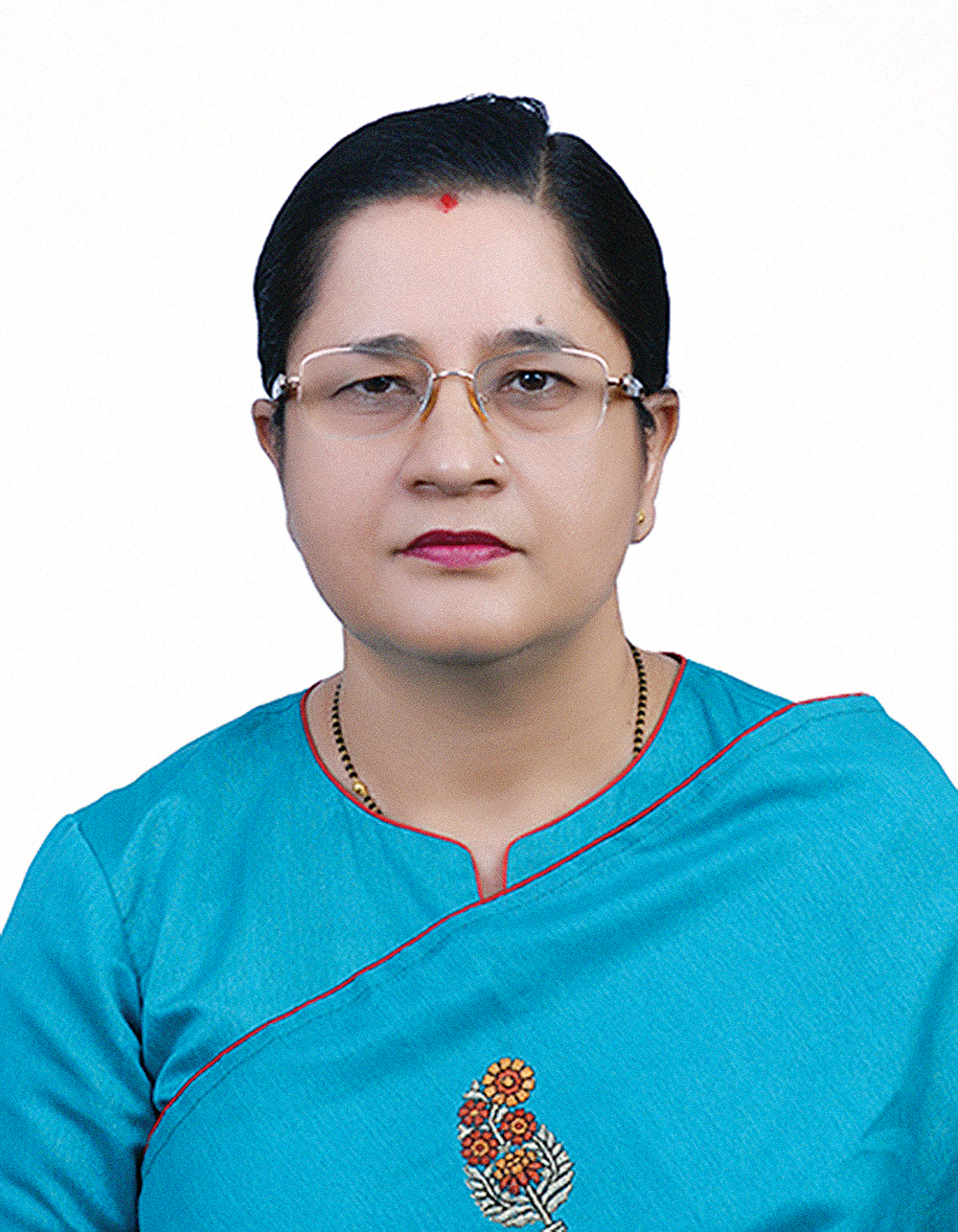
For the first time in the history of Nepal, Neelam Dhungana Timsina was appointed as the Senior Deputy Governor of Nepal Rastra Bank on March 9, 2021. She is the first woman to reach a high designation at the central bank. Currently, she is also a board member of Social Security Fund of Nepal. Prior to her appointment as Deputy Governor, Timsina was the Executive Director of Public Debt Management Department of the central bank and was concurrently the Chairperson of the Board of Directors of the Credit Information Bureau of Nepal. During her career as a central banker, spanning more than two decades, Deputy Governor Timsina gained significant experiences in different functions of central banking such as in economic research, bank supervision, foreign exchange management, internal audit and the central bank’s provincial office operations.
Deputy Governor Timsina holds a doctorate in Management from Mewar University, India. She graduated with a Master’s degree in Economics from the University of Wollongong, Australia and holds an MBA from Tribhuvan University. Additionally, she has published numerous research papers in peer-reviewed journals and has contributed various articles related to finance and economics in national and international magazines and periodicals as well as chapters in books.
Timsina believes that women’s economic empowerment ensures that women can equally participate in and benefit from decent work with social protection; have control over their own time, lives, bodies, resources, voice and have freedom of economic decision-making. She advises young aspiring female entrepreneurs to maintain a work-family balance along with equipping oneself with values incorporating hard work, honesty, patience, and integrity.
“In my tenure, ‘Guidelines related to Discouraging Sexual Harassment in Work Place’ has been issued in Nepal Rastra Bank. It provides assurance to women staff to confront against sexual harassment in the workplace.”
Om Devi Malla
Chairperson, National Cooperative Federation of Nepal
-1712732754.jpg)
Born in Gorkha, Om Devi Malla is the first Nepali co-operative woman leader who graduated with a diploma in Co-operative Education and Management from NCCE New Delhi, India. She also has a Master’s degree in Sociology from Tribhuvan University. Malla embarked into a career in the cooperative sector in 1997, over time going on to become the first vice-president of National Cooperative Federation of Nepal. She is also the first person representing the area of cooperatives as a parliamentarian.
For her dedication to the development of cooperatives, she was elected to the position of global board member of the International Co-operative Alliance (ICA) in Kuala Lumpur, Malaysia in 2017, a first for Nepal. Malla has been a consistent advocate for women’s leadership. When the constitution was being drafted in 2015, she played a crucial role in raising her voice in the parliament to encourage women empowerment especially in the cooperative sector. She believes that the cooperative sector not only empowers an individual but also builds the resilience of the community.
“Women must be passionate about entrepreneurship to be able to achieve success. There is strength in finding a similar group of individuals with common motives like in cooperatives, this can become your strength when things get rough”.
Padmasana Shakya
Chairperson, Manushi Laghubitta Bittiya Sanstha
-1712732902.jpg)
Along with a passion for social work and women issues, Padmasana Shakya has worked to create employment opportunities for the poor and disadvantaged women by providing them with entrepreneurial skills. She established Manushi in 1991 committed to addressing gender issues, promoting gender equality and sustainable development, enhancing social and economic status of women, and putting women at the forefront of human development.
She was the former Chairperson and Advisor of Fair-Trade Group Nepal, Chairperson of Micro Credit Association of Nepal and a member of Asian Peoples Fund, Japan, Federation of Handicraft Associations of Nepal and Lalitpur Chamber of Commerce and Industry. She is the Executive Secretary of South Asian Women Development Forum and member of Zonta International Club Nepal.
Shakya has also been awarded with several recognitions including the Gorkha Dakshin Bahu and the Priyadarshini Award.
She believes that financial empowerment means to have control over resources, be self-sufficient, have freedom of choices, contribute to community development and gender equality.
“Entrepreneurship often involves facing obstacles and challenges. Solve the problems by viewing challenges as opportunities to learn and grow”.
Savitree Thapa Gurung
Former Commissioner, Commission for the Investigation of Abuse of Authority
-1712733002.jpg)
Savitree Thapa Gurung is a strong and resolute woman who fought for the male dominated position of Commissioner at the Commission for the Investigation of Abuse of Authority (CIAA). She had never envisioned becoming the Commissioner of CIAA but as fate would have it and as a professor of political science at TU for 26 years, Gurung was appointed by the country’s President to the position of Commissioner of CIAA.
As the first woman commissioner in the 32-year history of the CIAA, Gurung faced substantial challenges, however she fought them successfully completing her six-year tenure with impactful changes.
She established the precedent of having at least one woman commissioner in the history of the CIAA, becoming an example of women’s inclusion in this constitutional organisation. During her tenure, Gurung initiated the mandatory participation of women civil servants in various meetings, gatherings and policy discussions. She also made it compulsory for women officials to participate in foreign policy meetings, training sessions, workshops, or delegations, breaking the previous trend of male-dominated participation.
She affirms that economic empowerment is the key to independence, enabling everyone to make their own choices without relying on others to fund or support their businesses, particularly for women.
“Given that many women are homemakers and economically dependent on men, achieving economic independence is crucial. Every woman should be economically independent, allowing them to decide their own choices without depending on others for every detail of their lives”
Shanti Chadha
Managing Director, Nepal Woman Crafts
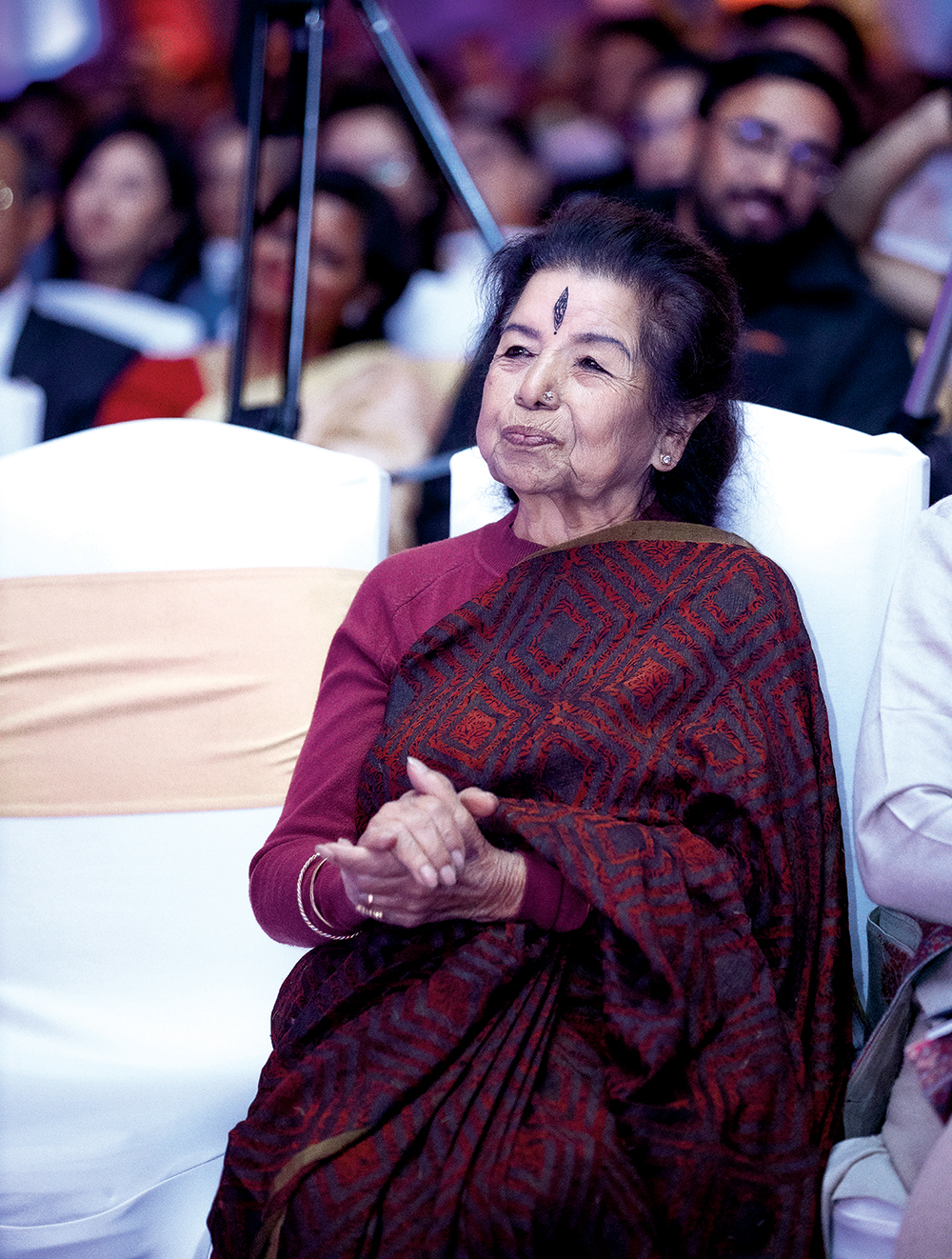
Shanti Chadha is the Managing Director of Nepal Woman Crafts. A strong proponent of women’s economic empowerment she has worked relentlessly close to four decades to create an impact on women’s socio-economic issues in the country. She has impacted thousands of women and families through skill development and economic empowerment initiatives through her personal efforts, her businesses, and her affiliation with several organizations like FNCCI NCCI, FWEAN, SCWEC, HASTAKALA, SAWDF among others.
She specialises in marketing management, enterprise and export management and skills development and has undergone studies and professional courses with reputed international institutions like Cranfield University (UK), Boston College (USA), Helsinki School of Economics (Finland), University of Philippines. Widely travelled through the globe, she began her career at the age of 15 as the personal secretary to the Nepalese Ambassador to Rome. She is also a licensed guide, has worked in the travel business, introduced the first mountain flight in Nepal, a trained interior designer, and worked with the government with the Women’s Skill Development Project in the eighties.
She is represented on the board of several organizations and is a founder member of WEAN (Women Entrepreneurs Association of Nepal), the founder President of Federation of Women Entrepreneurs Association of Nepal), former Vice President of the SAARC Women Entrepreneur Council, Founder Member of Hastakala, Executive Member for three consecutive terms of FNCCI, Founder Member of WEAN Cooperative and Manushi among others.
Her personal initiative is Nepal Woman Crafts of which she is the Managing Director. NWC are manufacturers, wholesalers, retailers and exporters of handmade Nepali paper and paper products and merchandisers of handicrafts. NWC works with marginalized groups in the far western region of Nepal and has impacted the lives of over 2000 families by creating work opportunities and means of livelihood for them.
Shanti Chadha is the recipient of several national and international awards and honours including the SAARC medal, Desh Naresh Samaj Sewa Padak, Woman of the Year 2003 and SAARC Best Woman Entrepreneur 2010. She has travelled widely across the globe and is invited to speak and share her experiences and insights including at the United Nations, Geneva.
She believes that the path to economic prosperity, employment, and gender equality lies in partnering and creating key alliances at the grassroots level itself. She also strongly believes that life is beautiful and every challenge can be overcome in life, and most importantly if you are in a position of influence – whether in a big or small way – you must give back to the country.
“You must never work just for yourself. That’s easy. You must contribute where you can. I believe that it is important to create and foster good from the work you do. Impact does not always have to be big; it can be in the small things you do. The important thing is to work for greater good, to be inclusive”
Shreejana Rana
President, Hotel Association Nepal
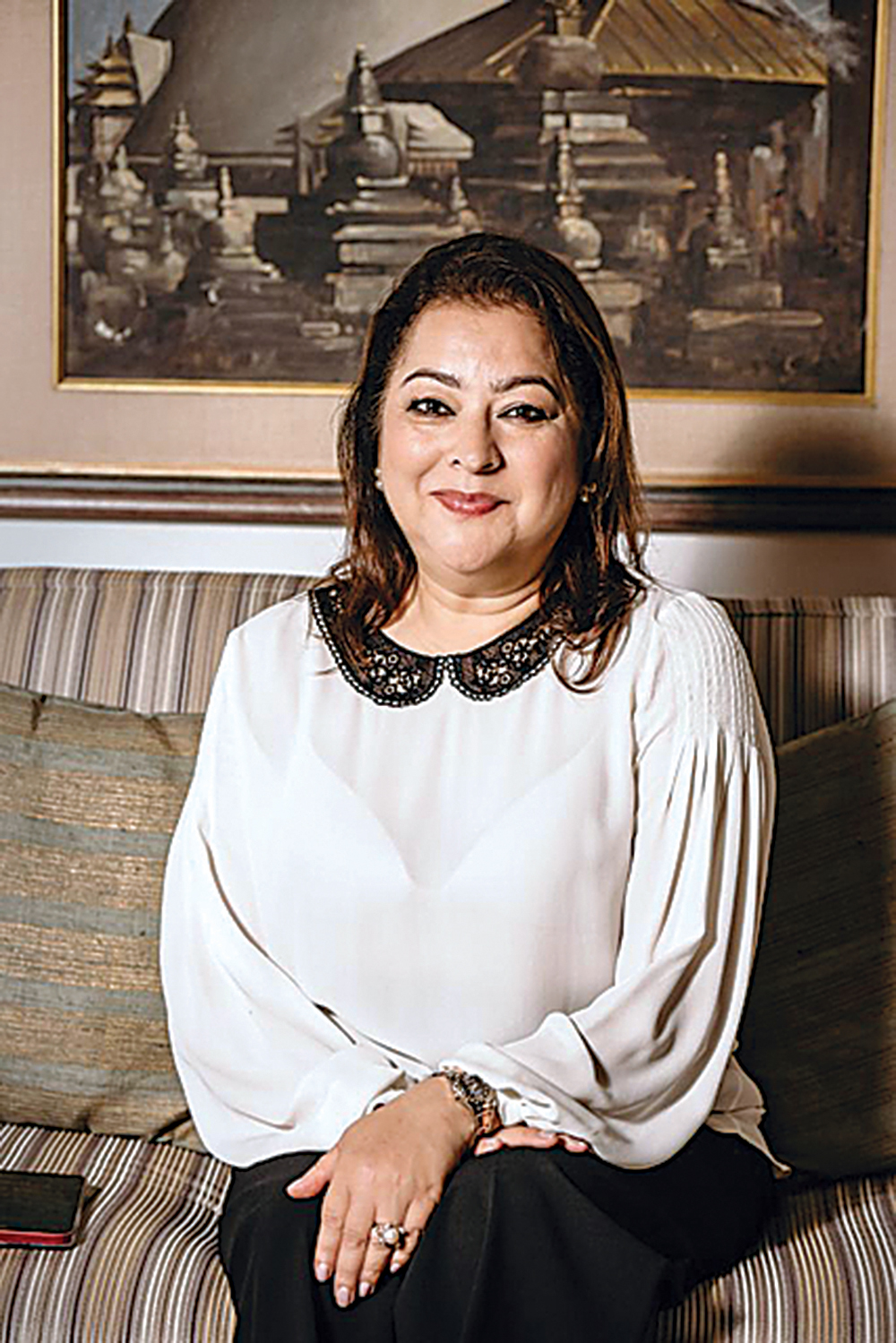
Raised by a single mother, Shreejana Rana is an alumnus of St Mary’s High School and graduated high school from Cambrian Hall, in Dehradun. Her hospitality industry journey commenced with a five-year hotel management course with ITC Welcome Group in the 1980s. After marriage, she became the Executive Director of her family-owned Hotel Annapurna.
In 2019, she was elected as the first woman to hold the position of President of Hotel Association of Nepal at its 46th annual general meeting. After successfully navigating all the challenges that Covid brought during her tenure, she was offered to continue a second consecutive term as the president in 2022.
Additionally, since 2019, she is also the first woman President of Nepal-India Chamber of Commerce and Industry. And in July 2022 she became the first Nepali to be elected the Governor of Zonta Club District 25, an organisation fighting for women’s rights in its member countries which includes Nepal, India, Bangladesh and Sri Lanka.
Through her experiences she believes that financial and economic empowerment is when one is able to understand and analyse one’s financial standing and ensure that one’s ‘books are clean’. Additionally, she encourages women to strive to have autonomy over their finances. She affirms that this will enable them to independently support themselves and also, very importantly, to learn the importance of savings.
“My one piece of advice for aspiring women entrepreneurs is to make sure their governmental compliance, taxes, company renewal, audit and other such government and legal paperwork are up to date. Any matters related to the law of the land and government rules should be clear and should not be allowed to become a source of problems for the company”.





-1765706286.jpg)
-1765699753.jpg)